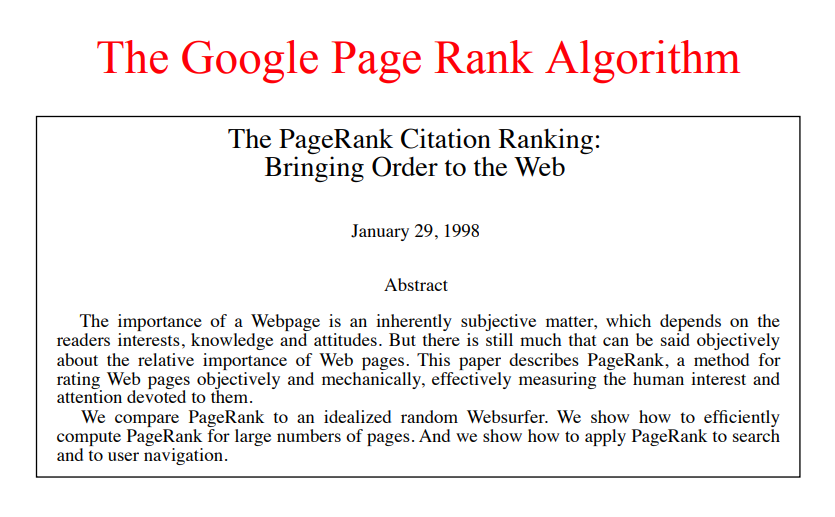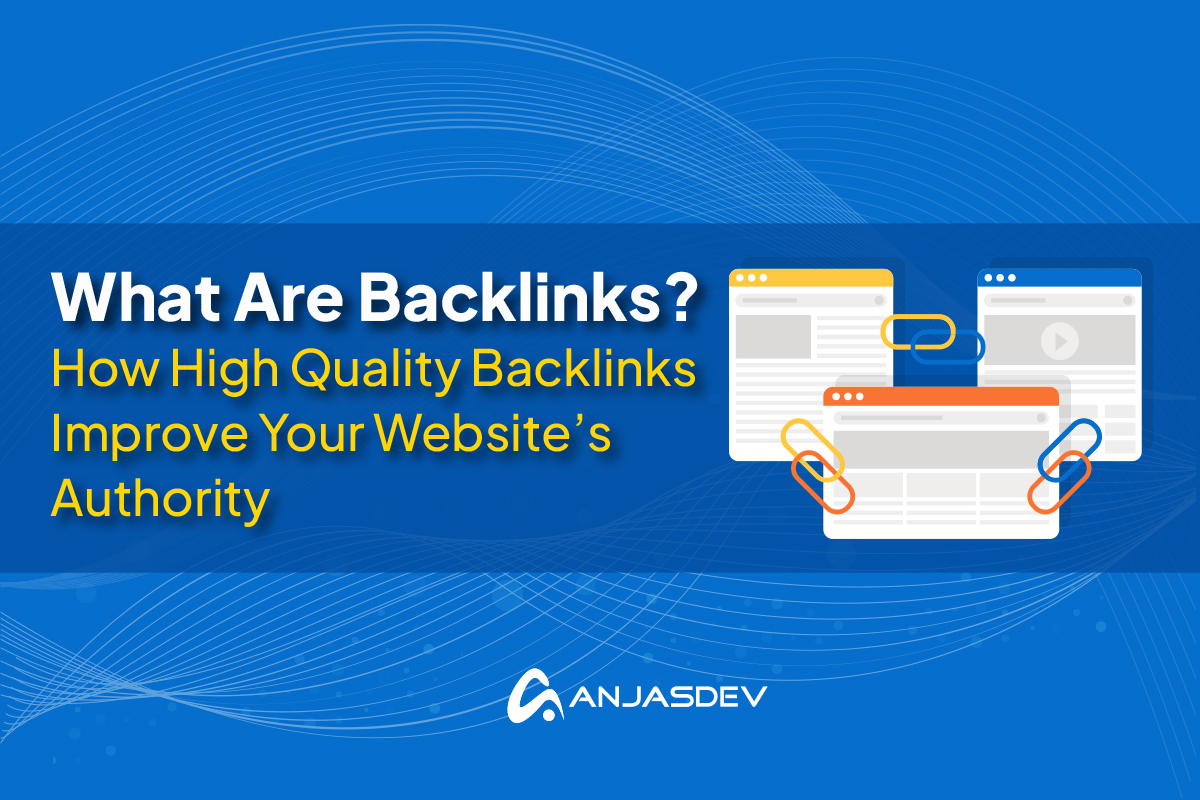Backlinks are one of Google’s top three ranking factors, yet 94% of all content on the web doesn’t have any backlinks to it [Backlinko]. So, it’s important now more than ever to make sure your website and its most important pages and features become part of the 6% that benefits from the power of backlinks.
In this article, we’ll go over what backlinks are, the types of backlinks, how to generate high-quality backlinks, and common pitfalls to avoid.
What are Backlinks?
Backlinks are links to your website that are featured on other sites. Usually, this is done to reference your website or webpage as a reputable and trusted source for additional information or as a valuable resource.
Here’s an example of what one looks like from one of our previous blogs:
As you can see, our backlinks direct readers to some reputable third-party digital marketing software, which increases traffic to those sites. But why would we want to bring more notice to other websites?
Backlink generation is a key part of off-page SEO. By linking to others, you increase the trustworthiness of your site and, in turn, may also get valuable backlinks to your own site from other domains.
Backlinks have been an integral part of search engine algorithms since their inception, and they are used as ways to show a site’s authority on the web. For example, it was one of the main factors of Google’s PageRank algorithm all the way back in 1998!

Source: Stanford University
How Backlinks Work?
Backlinks take the form of hyperlinks. Although we come face to face with hyperlinks every day, there is a certain power in backlinks that makes them all the more valuable to businesses and brands.
The performance of hyperlinks can be tracked, creating what is known as a click-through rate (CTR). It’s also possible for hyperlinks to create a reference in the URL, helping the site to know where the traffic has come from, whether Google search, email, or a referral from another site.
When it comes to how search engines view backlinks, they function like votes of confidence in your website. As a result, it helps the algorithms to know that it is a valuable resource to users, and so it has a higher ranking on the SERP (search engine results page).
If you include backlinks to other websites on your pages, this also has a positive impact on how search engines perceive your content. Citing other websites and sources can also increase the quality of your pages in the eyes of search engines, highlighting them as more relevant to the user.
Types of Backlinks
Not all backlinks are made equal. Here is a rundown of the types of backlinks, what they are, and how to use them.
Dofollow vs. Nofollow Links
Some links don’t count towards your performance on search engine algorithms. These are what we refer to as nofollow links. Often, you can tell if a link is a nofollow link by looking at the HTML code. For example:
<a href=”https://example.com” rel=”nofollow”>This is a nofollow link</a>
Thankfully, most of the links on the web are dofollow backlinks, meaning that they will count toward search engine ranking. On the rare occasion that nofollow links are used, the content they link to is only sometimes all that relevant anyway, so it doesn’t have that much impact on SEO performance.
Natural vs. Artificial Backlinks
The best backlinks are natural backlinks, as they are valued the most by search engines, especially as their ability to detect them is becoming even more sophisticated. Natural backlinks are ones that you took no part in creating or facilitating — they are simply a testament to other websites and users thinking your content is meaningful enough to be featured on their page. If you can secure natural backlinks regularly, it says a lot about the quality and credibility of your site.
On the other hand, artificial or unnatural backlinks are those generated through buying links, link exchanges, and using programs or tools to create backlinks for you. As these backlinks are generated without input from real internet users, they are seen as less valuable and, in some cases, can lead to your site being penalized in violation of the Google Webmaster Guidelines.
High-Quality vs. Low-Quality Backlinks
You’ll often hear people talking about the importance of generating high-quality backlinks. But what does this mean?
Links that are generated naturally and that come from authoritative and trustworthy sources are seen as high-quality backlinks.
Low-quality backlinks are those generated primarily through unnatural means, like those we just talked about in the previous section, that add little to no value to the website. These irrelevant links are more likely to land you in SEO trouble than benefit your digital marketing efforts.
Internal vs. External Backlinks
Finally, internal and external backlinks are summed up pretty much by their names. Internal backlinks will link to other relevant parts of your own website, while external links will take the user to another website deemed to be useful and relevant to the content.
Importance of Backlinks in SEO
But what are the benefits of backlinks?
There are four main reasons why backlinks are an integral part of SEO practices — we’ve outlined them below.
- Firstly, they significantly impact search engine rankings. Search engines like Google view backlinks as votes of confidence from one website to another. The more high-quality backlinks a site has, the more likely it is to rank well in search results. This is because backlinks indicate that other reputable sites find your content valuable and worth referencing.
- Backlinks also contribute to domain authority and page authority. These metrics use SEO link analysis to gauge how well a website or specific page might perform in search rankings. Sites with strong backlink profiles typically have higher domain and page authority, which correlates with better search performance.
- Another benefit of backlinks is referral traffic. When users click on backlinks from other sites, they’re directed to your content. This not only increases your site’s visibility but also attracts interested visitors who may convert into customers or regular readers.
- Lastly, backlinks enhance brand visibility and credibility. Being mentioned and linked to by respected websites in your industry can boost your brand’s reputation. It positions you as an authority in your field and can lead to increased trust from both users and search engines.
Strategies for Building Quality Backlinks
If you are wondering how to create quality backlinks, here are a few techniques you can apply to build high-authority links.
Content Creation and Promotion
Creating high-quality content, including articles, videos, studies, and infographics, can increase your chances of backlinks from other websites. A robust content strategy is key to your backlink-building strategy, and the more unique or original the content is, the more likely it is to be featured elsewhere.
Guest Blogging
Alongside creating content for your own website, becoming a guest contributor or poster for another prestigious website in your industry can be a great way of getting your name out there and a natural backlink. Usually, in the author section of such guest blogs, the link to that person’s business or website is featured.
Broken Link Building
Broken link building involves scouting other websites in your industry and finding their backlinks that are broken or no longer functional. When finding competitor backlinks like these, you can then reach out to the website owner and suggest they link to your own functional content instead.
Influencer Outreach
Influencers are key figureheads in the online community and hold great sway over different niches and target audiences. Reaching out to influencers to feature your product or service can often result in a backlink from their website and social media pages. Not only that, but it provides valuable off-page marketing, too.
Social Media Engagement
By utilizing your social media accounts to create engaging and informative content, you increase the likelihood of social backlinks, shares, and mentions of your brand. Make sure to post regularly from the social media accounts attached to your website to capitalize on user familiarity and interest.
Related: What Is SEO and Why Is It Important?
Backlink Analysis and Monitoring
How many backlinks you have and how much traffic is generated through your site from them can be hard to track on your own. That’s why there are some great backlink monitoring tools out there that can do the hard work for you. Top picks include Ahrefs, Ubersuggest, and the Semrush Backlink Gap Tool.
Key metrics you should be tracking include:
- The total number of backlinks: this number includes multiple backlinks from the same domain.
- The number of referring domains: the total number of website domains that have a link to your website or webpage.
- Organic traffic: the amount of unpaid visits to your website.
- Links per campaign: tracking how many backlinks you have earned from off-page SEO campaigns and actions.
- Low-quality backlinks: check for backlinks on your site that could potentially be from low-quality or spam sources. Removing these will positively affect your performance. Backlink quality analysis tools like those mentioned above can help with this.
- Anchor text: the common anchor text used when creating backlinks to your site can help you pick out key themes and potential new keywords.
- Competitor backlink analysis: finding out who competitors gain backlinks from can further inform your future backlink-building efforts.
Common Backlink Mistakes to Avoid
So, how do you avoid falling into the trap of acquiring bad or toxic backlinks? We covered previously how you can attain quality backlinks through strategies like guest blogging, blogger outreach and broken link building. But here are things you should never do that will harm the integrity and potentially the search ranking of your site.
- Buying links: even if it sounds tempting or the source claims to be reputable, it’s not worth it. Even then, purchasing high-quality backlinks can be costly.
- Taking part in link farms: Google and other search engines’ algorithms can spot link farms and backlink exchanges from a mile away. If caught, you risk being penalized.
- Over-optimizing anchor text: adding too many ranking keywords to your anchor text looks unnatural. Not only will users not like it, but advancements in search algorithms mean overuse of rich anchor text will do more harm than good.
- Ignoring relevance and quality: trying to just get any old backlink won’t help your SEO efforts. The most impactful backlinks are those with high relevance, quality, and authority, and backlinks that don’t meet these criteria are ineffective. Think backlink quality over quantity always.
If you want to avoid the pitfalls and springboard your business and its backlink generation, speak to the experts at AnjasDev about our link-building and off-page SEO services.
The Future of Backlinks in SEO
Although not as pivotal as in the early days of Google and other search engines, backlinks are still a major factor, and the technologies to understand their relevance continue to evolve.
AI has had the most recent impact in this space, helping search engine algorithms spot natural and unnatural backlinks and further understand the relevance of said links to the SEO efforts of that site.
For example, an AI with access to historical data of backlinks and click-through rates will be able to ascertain what websites are of the most value to users. They could also understand the semantics surrounding the backlinks to be able to categorize their relevance to certain industries or subject matters.
Wrap-up
So, although it can be easy to sleep on them, backlinks should be an integral part of your off-page SEO and general digital marketing strategy. They help to reinforce your status as a business and website, and it can be incredibly gratifying when they start to roll in!
If you need help getting started with building high quality backlinks and your backlink strategy, a consultation with AnjasDev will put you in the right direction for success. With specialized SEO services and over 10 years of experience in both on-page and off-page SEO techniques, book your time slot today.




